What are best books on binge eating?
Well, depends how you define ‘best’.
The best book for you personally depends on many situational factors, such as:
- What you know about bingeing in general. Are you a total beginner looking for a self-help book?
- What type of book you’re looking for. Are you looking for an autobiography, workbook, or something in between?
- Are you a clinician or social worker who wants to learn more about bingeing to help your clients?
- You already know about Binge Eating Disorder (BED) and you’re wanting to continue learning about healing, spirituality and psychology.
This blog post will list what I consider to be the 15 best books for binge eating.
- Books #1-5 are the 5 best self-books about binge eating for beginners.
- Books #6-10 for people who are more familiar with the disorder, such as clinicians who want technical information or people who are acquainted with therapy.
- Books #11-15 are workbooks for people who want practical
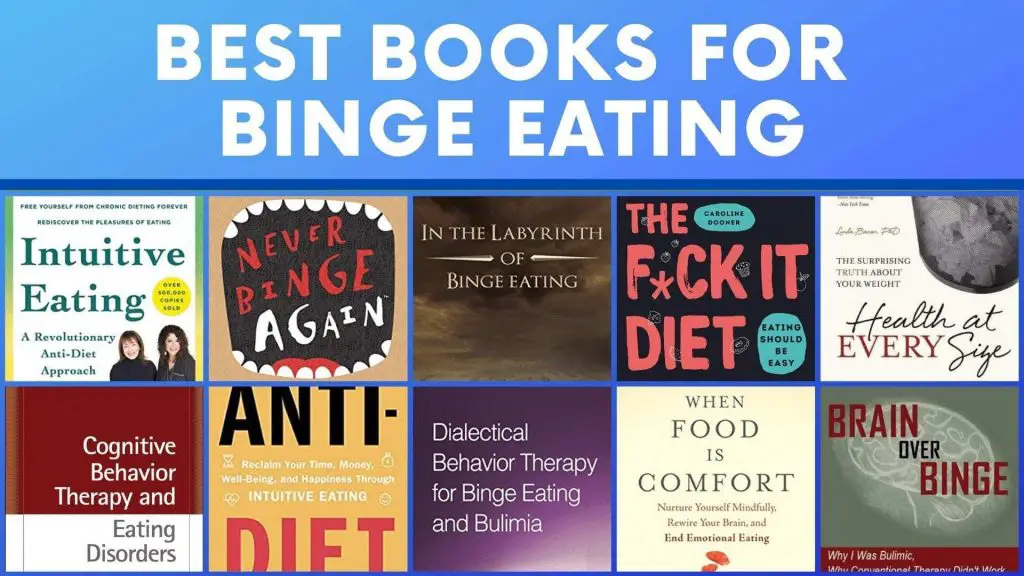
Please know that I have read, studied and appreciated all these books listed below.
Why did I read all these books?
My endless curiosity and dedication to healing from eating struggles myself is what lead me to this profession today as an Eating Coach at Eating Enlightenment, and Recovery Counselor at Cielo House for Eating Disorder Treatment.
As an Eating Coach, my life revolves around writing, teaching, explaining and coaching about overeating. These books have been a part of my journey, and it’s with great honor and gratitude that I share them with you today.
Please note: there are affiliate links within this blog article which help support this channel.
#1-5: Self-Help Books For Eating Disorder Sufferers
The books for binge-eating contain psycho-education and structured self help that have shown high effectiveness. These books are easy to read and follow, and may serve as a introduction to Binge Eating Disorder and it’s treatment.
1. Intuitive Eating: A Revolutionary Anti-Diet Program
Why is this book so great? Intuitive Eating contains the ‘big picture’ showing why people start binge eating and how they can heal from the disorder.
There are 10 principles of Intuitive Eating. These include, for example, principle #1, Reject The Diet Mentality, and principle #6, Feel Your Fullness.
Filled with exercises, eating disorder science and much more, this book is simply hands down a must have for anyone interested in beginning to heal their relationship with food.
2. Never Binge Again
In the opening pages Glenn summarizes binge eating disorder treatment in an easy to understand story about learning to ride a bike.
When you ride a bike, you expect yourself to fall down. But if you can quickly pick yourself back up and make adjustments, then you’ll be riding smoothly in no time.
It turns out this metaphor parallels exactly the journey to heal binge eating disorder. See, recovery from all eating disorders is like learning a new skill.
This book is simple and cuts to the heart of the matter.
3. In the Labyrinth of Binge Eating
This book is less known, but it contains one of the most powerful autobiographical stories of binge eating that I’ve ever stumbled across.
Hilda herself struggled with a severe binge eating disorder for decades, stemming from her early childhood of trauma and food addiction.
The stories she shares – from her loving husband, to running a medical practice while in the throes of binge eating, and much more – bring a truly human element to binge eating.
If you’re looking for a true story of someone who has been through mental health hell and back, look no further.
Other Great Autobiographical Binge-eating Books
- Binge and Sprint: From Endless Cake to Recovery
- Running in Silence: My Drive for Perfection and the Eating Disorder That Fed It
- Empty: A Memoir
- Fullness: A Memoir
4. The F*ck It Diet: Eating Should Be Easy
If you’re looking for a book with pizzazz and personality, here you go!
Caroline writes in an extremely friendly, entertaining manner and she covers the absolute essentials of why the dieting is not a good choice.
If you are a chronic dieter, or recognize that you fall into patterns of yo yo dieting, and you want a fun read, then this book is for you.
5. 12 Steps and 12 Traditions of Overeater’s Anonymous
Overeaters Anonymous is how many people first become introduced to the ideas of food addiction and compulsive overeating.
Overeaters Anonymous (OA) is a fellowship of individuals who, through shared experience, strength, and hope, are recovering from compulsive overeating.
This book welcomes everyone who wants to stop eating compulsively. There are no dues or fees. The primary goal of this book is to help readers abstain from compulsive eating and to carry the message of recovery through the Twelve Steps of OA.
#6-10: Eating Disorder Books for Clinicians and People Familiar with Therapy and/or BED
This section is for people who already know about BED, and want to learn more about the history of dieting culture, what all eating disorders have in common and the complex cultural factors related to eating disorder.
6. Health At Every Size
This book is a bit more of a difficult read and I debated putting it into the list of more advanced books.
However, this book literally sparked the ‘Health At Every Size’ movement, which you may have heard of before.
The Health At Every Size movement is much more than a health philosophy. It’s really a social justice message to empower people struggling with depression, body image and shame about their body.
If you are looking for a comprehensive understanding with lots of research, then this book is for you.
7. Cognitive Behavior Therapy and Eating Disorders
Dr. Fairburn writes with extreme confidence that all eating disorders have at their root the same cause and the same solution.
This book is specifically to help clinicians. It covers step by step instructions on how to beat eating disorders of all types by examining the underlying thought processes.
Be warned – It’s a tough read. But if you can handle scientific language and are really curious and determined, there’s probably no better resource out there.
8. Anti Diet
Ever wonder why dieting became so commonplace? Ever wonder about why BMI is a faulty and racist tool?
I personally found this book to be one of the most fascinating reads about why eating disorders developed from a cultural perspective.
If you’re looking for a historical perspective on why our nation became so crazy about weight loss, and what’s up with the current wellness industry, this book is for you.
9. Dialectical Behavior Therapy for Binge Eating and Bulimia Nervosa
If you want an in-depth look at how to tolerate intense emotions, then try this book.
Dialectical Behavior Therapy (DBT) is highly regarded and held in similar regard to Cognitive Behavioral Therapy (CBT).
This novel will help you get over cravings, urges and other physical and emotional sensations.
Be warned, though, this is a tougher read. But if you have a scientist mindset and want to take a specific approach to fighting your cravings and urges, this would be a great help.
10. When Food Is Comfort
This book takes a deep look into childhood.
If you know you have trauma stemming from your childhood and are looking for ways to heal that trauma, along with your food relationship, this book can give you a great step forward.
There are many specific exercises on how to eat better and reconnect with your inner child.
Since most of the other books on my lists don’t dive into childhood, I find this book to be particularly informative, covering a lot of ground that other books may neglect.
#11-15: Binge Eating Workbooks
Workbooks can be useful in getting more information and using tools more effectively. Instead of learning about the science, the books in this section assume you’re already familiar with the basic premise of BED and are ready for practical steps. Grab your pencil and prepare for the next step as there are several workbooks to choose from!
11. End Emotional Eating
Eating can all too easily become a strategy for coping with depression, anxiety, boredom, stress, and anger, and a reliable reward when it’s time to celebrate.
This book does not focus on what or how to eat—rather, teaches scientifically supported skills will teach you how to manage emotions and urges gracefully, live in the present moment, learn from your feelings, and cope with distress skillfully.
This book has been awarded The Association for Behavioral and Cognitive Therapies Self-Help Seal of Merit — an award bestowed on outstanding self-help books that are consistent with cognitive behavioral therapy.
12. Brain Over Binge
This is a really great book!
Part of me wants to put this book in the beginner section as it’s easy to read and quite practical.
However, this book does specifically focus on cravings and doesn’t focus on other issues, which is why I’m putting this book into the advanced category.
Plus, there’s also a deep dive into the basics of nutrition. With lots of practical exercises, it’s equally workbook and self-help.
13. Internal Family Systems – Skills Training Manual
Are you looking for a revolutionary, evidence-based approach to healing emotional wounding at its core? The Internal Family Systems- Skills Training Manual is here to provide straight-forward explanations and illustrations of a variety of applications. This manual incorporates unique meditations, downloadable exercises, and worksheets that are easy to read and highly practical so that you can find the best treatments for your needs.
The IFS methodology provides an accelerated approach grounded in neuroscience that is non-pathologizing and encourages self-compassion. This method has proven to be effective for individuals struggling with PTSD, anxiety, depression, substance abuse, and eating disorders. With step by step instructions and annotated case examples, anyone can benefit from this insightful training manual!
It’s time to unlock the possibility within yourself. Utilize the IFS skills training manual so that you can take control of your emotions and get back clarity on their internal world.
14. The Binge Eating Prevention Workbook
Do you feel like your life is out of control when it comes to food? Do you find yourself in cycles of deprivation and binge-eating? The challenge is that what works for one person may not work for another. That’s why The Binge Eating Prevention Workbook offers comprehensive evidence-based tools specifically designed to help you take charge of your eating habits.
This eight-week protocol will give you an understanding of the underlying causes of your binge eating, allow you to recognize triggers that lead to binging, provide techniques to cope with difficult emotions, give you tips on improving relationships, and offer guidance on making healthy food choices.
The Binge Eating Prevention Workbook has a range of activities, reflective exercises, and other resources that can help you break through feelings of being overwhelmed and gain a sense of mastery over your eating behaviors. With this program, we are here to support and guide you every step of the way. Together we can develop long lasting habits that will benefit not just your body but also enrich your life in every aspect imaginable.
15. The Intuitive Eating Workbook
Put yourself on the path to emotional and physical wellness with The Intuitive Eating Workbook. An evidence-based program developed by trusted and renowned authors, this workbook empowers you to develop a healthy relationship with food, discover the cues of hunger and satisfaction, and nurture a profound connection with your mind and body.
Heavily grounded in the teachings of the ten principles of intuitive eating, The Intuitive Eating Workbook shows you how to abandon unhealthy weight control behaviors, have a more positive body image, and—most importantly—stop feeling overwhelmed by it all. If you’re too often using food as comfort or distraction when stressed or anxious, this workbook can help you build better habits that will be beneficial to both your emotional wellbeing and physical health.
Put an end to feelings of guilt about trying to eat “right” and start living in harmony with who you really are. Get The Intuitive Eating Workbook — because eating should never be hard again!
How do I stop feeling guilty about binge eating?
The first step to stopping feeling guilty about binge eating is to practice self-compassion. Remind yourself that you are not responsible for developing this behavior, and it is not your fault. Acknowledge that it may be the result of past trauma, a culture of dieting and thinness, or even something you learned from role models in your life.
Second, try to come to terms with the guilt you feel by understanding where it comes from. Try using Internal Family Systems therapy to help identify the critic part of yourself and discover what burdens the guilty parts of you are holding onto. With this insight, you can begin to work on releasing these burdens and replacing them with healthier coping skills.
Finally, consider finding a therapist or support group who specialize in binge eating disorder. They can provide you with additional guidance and help you to find healthier, more sustainable ways of managing your emotions and behaviors. With the right resources and support, you can begin the journey to recovery.
Ultimately, it is important to remember that feeling guilty about binge eating is not something you should have to carry alone. It may take some time and effort, but you can come out of this feeling empowered instead of judged. Take the steps necessary to move forward with kindness towards yourself and your body. You deserve compassion just as much as anyone else!
What is the root cause of binging?
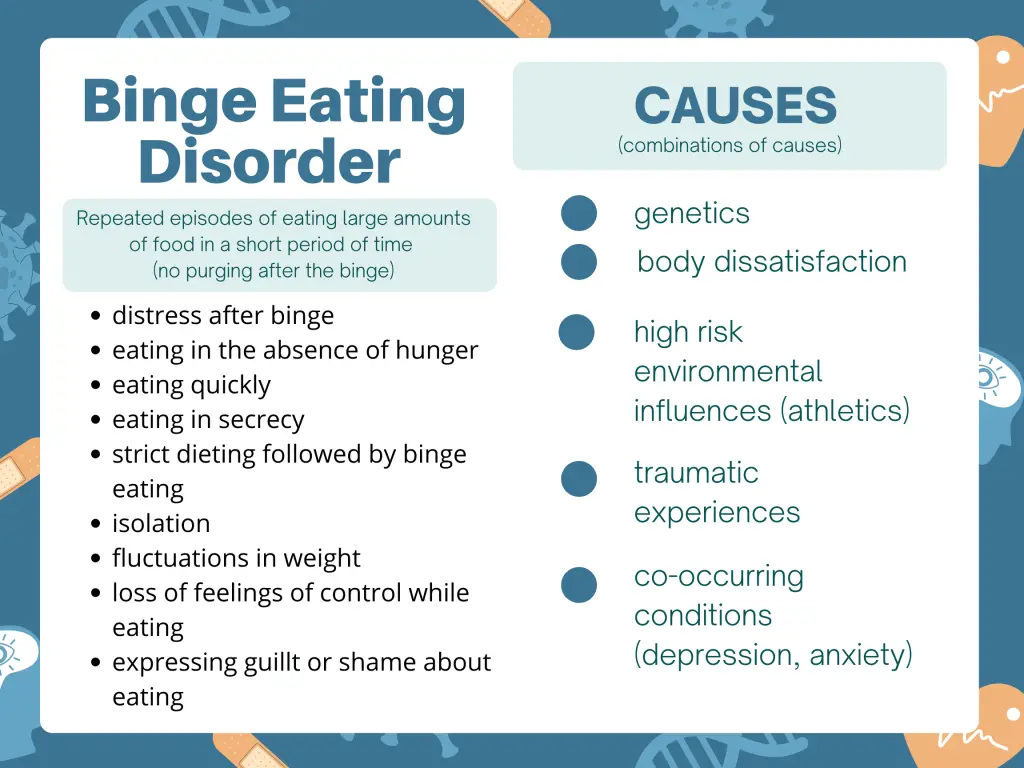
The root cause of binging can vary from person to person, but there are a few potential contributing factors. These include: dieting, childhood trauma, culture and social norms around body image, genetics, alcohol or other substance abuse, Obsessive-Compulsive Disorder (OCD), and anxiety disorders such as PTSD or Panic Disorder.
Dieting can lead to deprivation which can cause overeating in an attempt to compensate for the lack of calories. Childhood trauma can create emotional instability that leads to impulsive behaviors like binge eating.
Cultural pressures about body image and thinness may prompt some people to attempt to control their weight through extreme diet or exercise practices.
Genetics and brain chemistry may also play a role – certain chemicals like serotonin have been linked to compulsive behavior surrounding overeating and food addiction.
What are the psychological reasons for overeating?
Psychological reasons for overeating can include stress, anxiety, depression, loneliness, self-medication of emotions, and an attempt to escape from unpleasant thoughts or feelings. Overeating is a way to temporarily numb out difficult emotions or provide a distraction. It can be a source of comfort when you’re feeling down and isolated.
Overeating is often a coping mechanism for dealing with stressful situations that you feel unable to control. Other psychological factors related to overeating include past experiences with food (such as dieting), trauma, guilt surrounding food choices, perfectionism, and body image issues.
A combination of these reasons may be at the root of an individual’s overeating habits. Healing these underlying emotional issues can help to reduce the urge to overeat.
Supporting yourself through self-care and creating a positive relationship with food can also be helpful in curbing binging behavior. Self-care can include getting enough sleep, connecting with friends or family, exercising, journaling or meditating, or engaging in an activity you enjoy. Developing healthier habits around food such as mindful eating practices and honoring your hunger cues can help to foster a healthier relationship with food and reduce binging episodes.
Now that you have some background information about binge eating disorder, it is important that you take action to address it. Consider reaching out to a therapist who specializes in treating this condition so they can provide you with personalized advice and support on how to manage it.
What is considered binge eating?
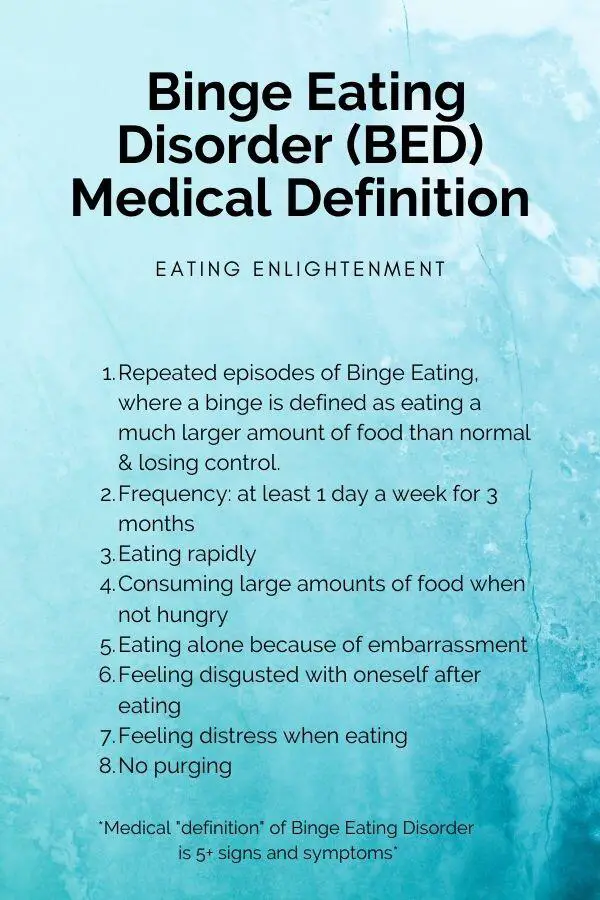
According to the DSM-5, binge eating is defined as consuming an unusually large amount of food in a short period of time (at least 2 hours) and with a sense of loss of control. Additionally, individuals struggling with binge eating disorder often have feelings of guilt or shame surrounding their episodes. Binge eating can occur on its own, but it can also be associated with other mental health conditions such as depression, anxiety, or an eating disorder. It is important to note that not all cases of overeating are considered binge eating; the episodes need to meet specific criteria before they can be diagnosed as such.
However, most people don’t use the technical definition of binge eating when they refer to overeating. In common terms, a binge is when someone eats a large amount of food in one sitting, often much more than they need or want. They may also engage in what is known as “emotional eating”; consuming food to cope with difficult emotions such as sadness, anxiety, or boredom.
Check out this video for more information about the “Binge-Restrict Cycle”
What is orthorexia?
Orthorexia is a condition in which an individual becomes obsessed with eating healthy or “pure” foods. Individuals suffering from orthorexia may limit their food intake to organic, non-processed, and otherwise “clean” foods.
They may obsessively count calories and weigh themselves regularly, put severe restrictions on what they will eat, and become socially isolated due to the intensity of their dietary habits.
Orthorexic patients are often at risk for malnutrition as well as other physical and psychological health issues. Treatment for orthorexia typically involves cognitive behavioral therapy and nutrition counseling to help individuals learn how to create healthy relationships with food.
Is binging a coping mechanism?
Binging can act as a coping mechanism for some individuals who are struggling with difficult emotions. It can provide an escape from reality, and temporarily numb or distract from negative thoughts or feelings. Binge eating is often associated with low self-esteem, body image issues, or trauma. People may use food to cope with the stress of everyday life, or to avoid dealing with painful experiences from the past.
In Internal Family Systems, the “Food Comfort” part of you is seen as a “protector”. This protector part of you is trying to keep you safe, even if the means it uses are unhealthy or counter-productive. Understanding this and providing yourself with other coping strategies can be helpful in curbing binging behavior.
How do you motivate yourself to stop overeating?
Motivating yourself to stop overeating can be difficult, but there are some strategies that may help.
- Start by recognizing your triggers for overeating and developing healthy coping mechanisms to manage them.
- Acknowledge any negative emotions such as guilt or shame that you may have around food and address them directly with a therapist.
- Learn mindful eating practices so that you can respond calmly when faced with cravings or the urge to binge eat.
- Make sure to practice self-care and engage in activities that bring you joy and satisfaction. Finally, remember that progress takes time—you don’t have to make changes overnight.
Making small, sustainable changes each day will get you closer to managing your overeating habits in the long run.


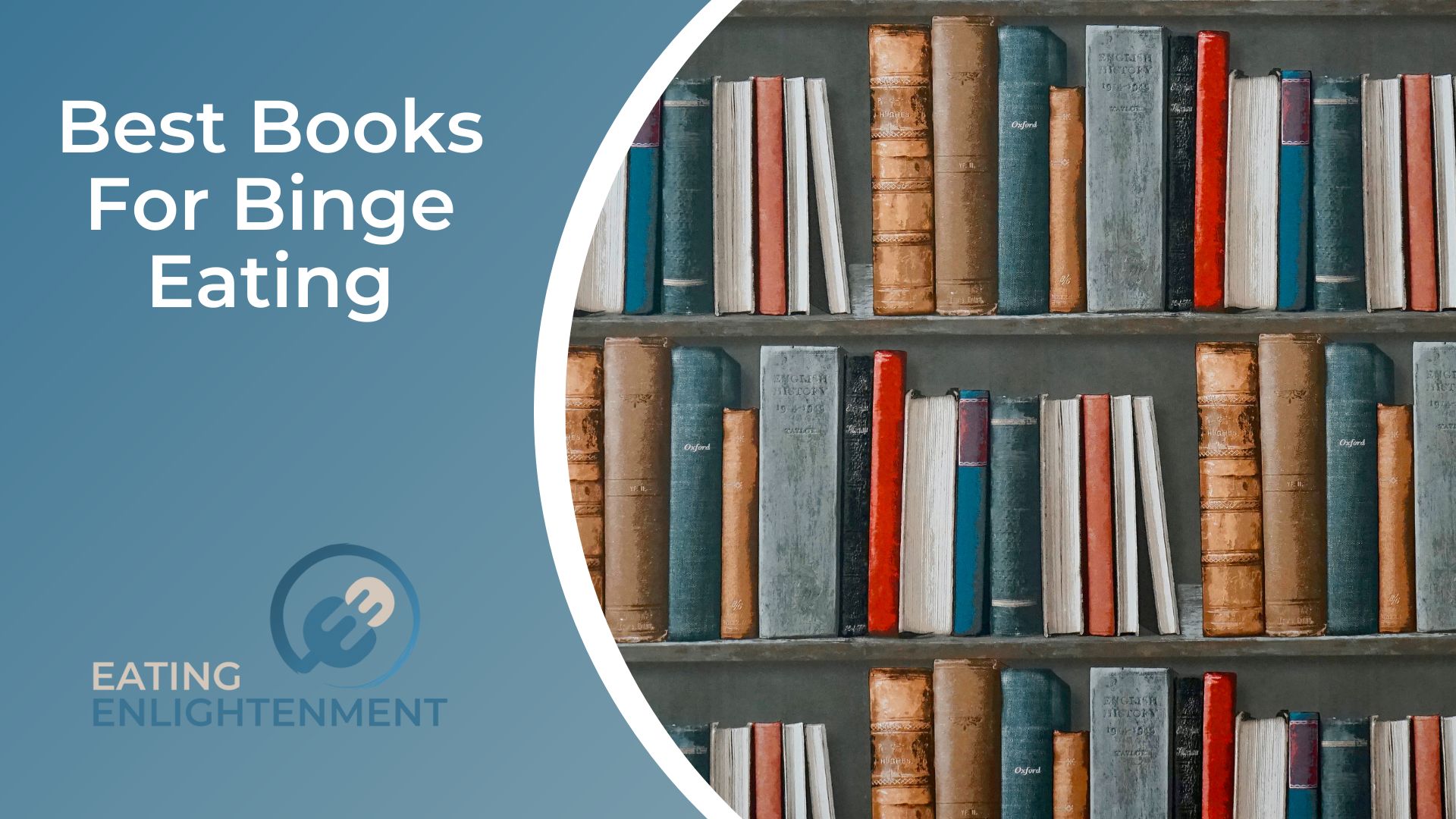
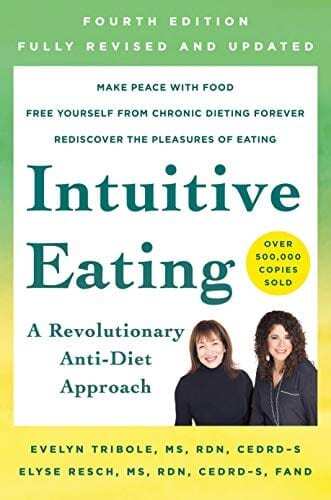
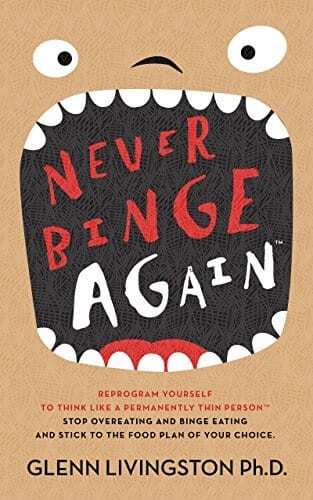
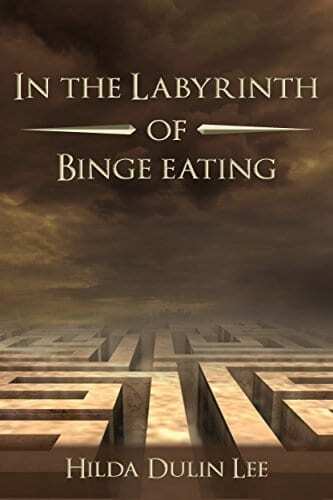
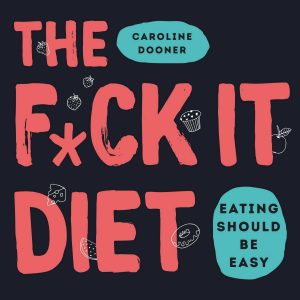
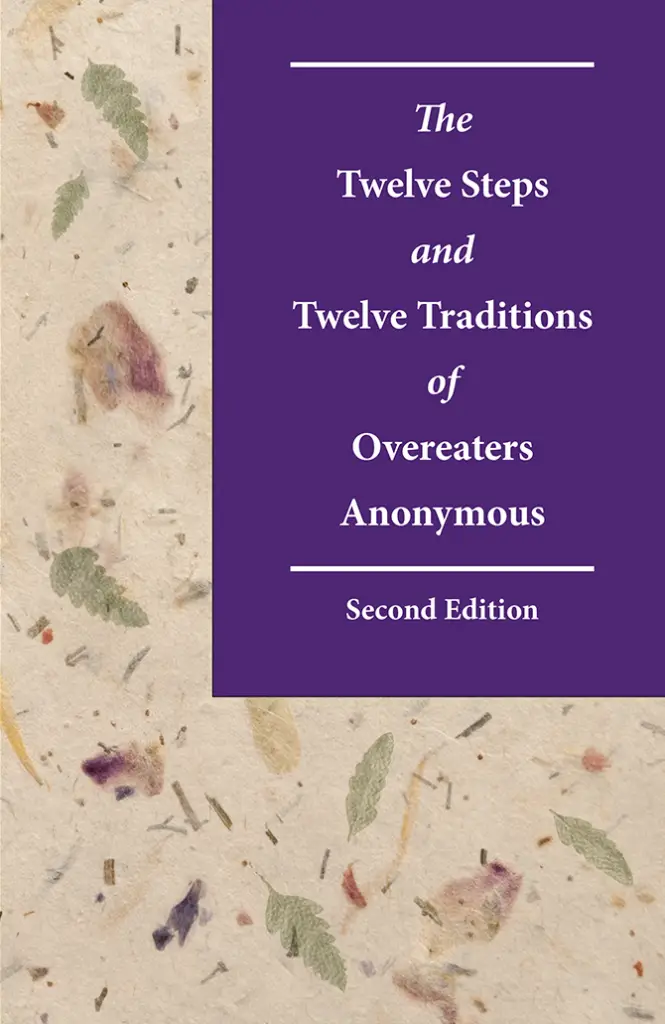
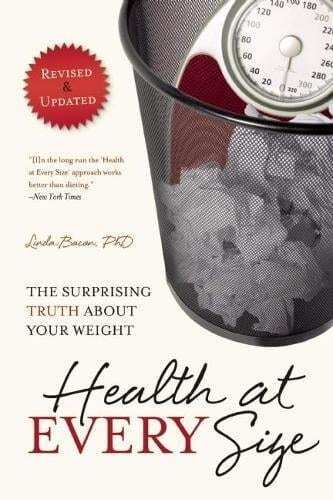
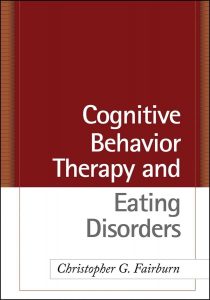
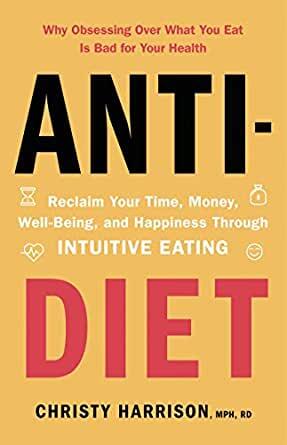
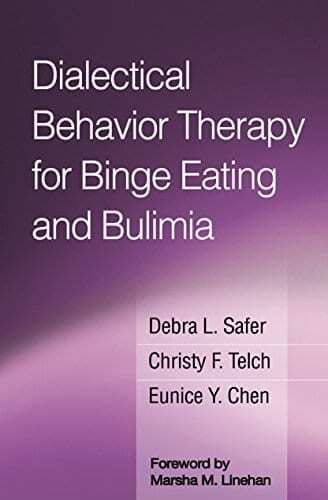
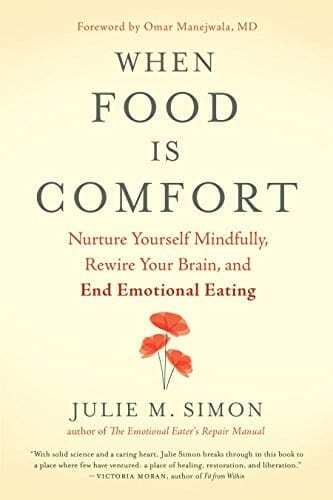
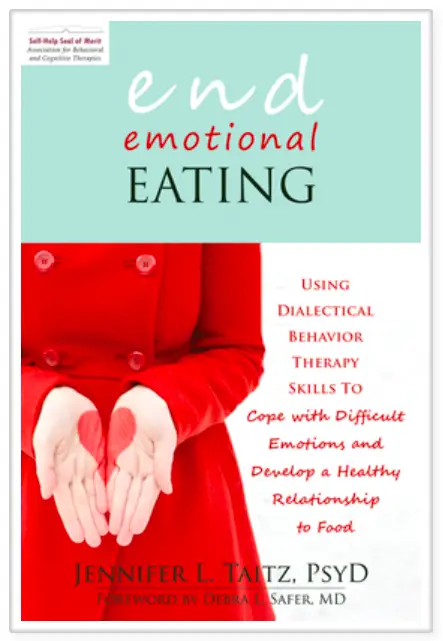
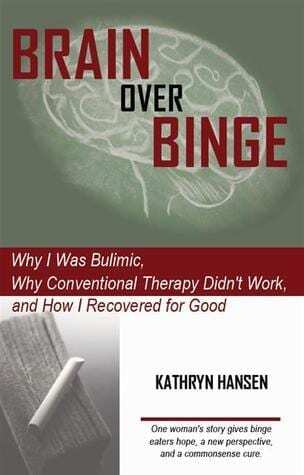
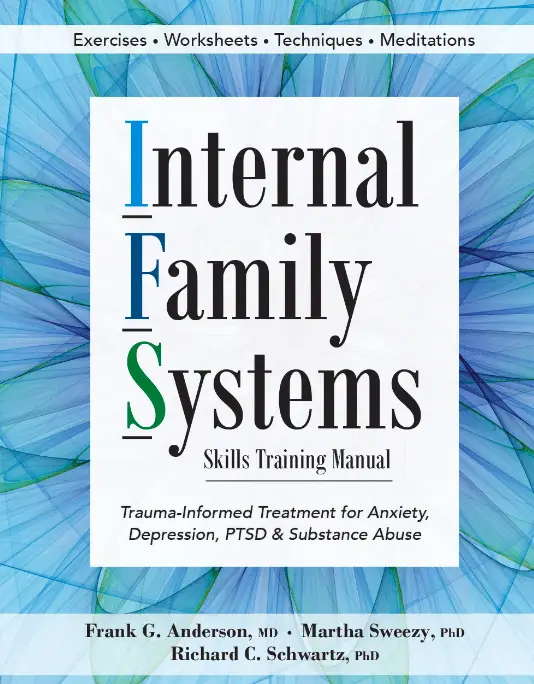
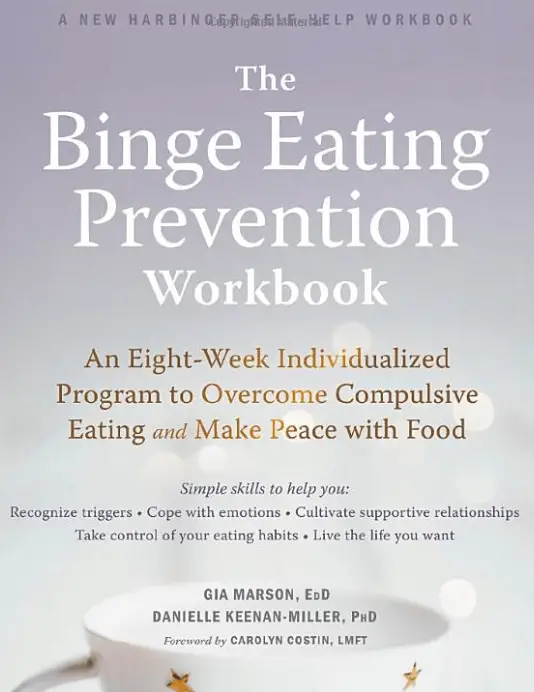
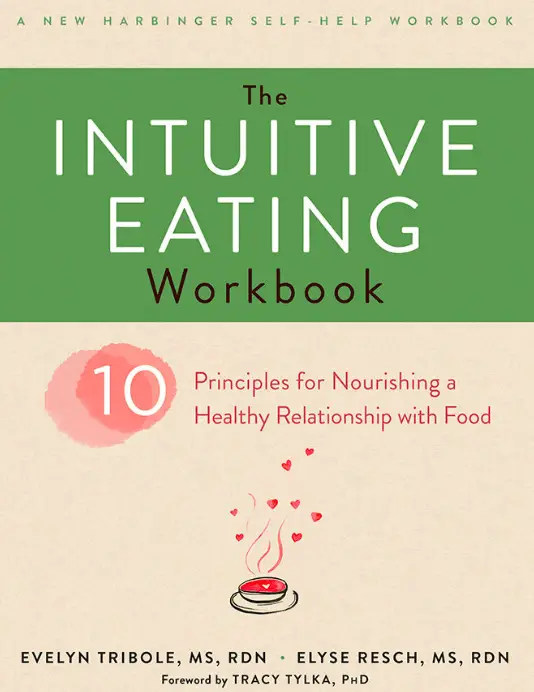


Hello Jared 🙂
I found your page because a friend recommended it.
Most of these books I know and also like them.
So I would like to add one book, it is called:
“Farewell to binge eating:
An Autobiographic Companion for the Journey from Food Addiction to Joyful Eating Without Guilt or Shame”
Maybe you are interested in reading it. It is available via Amazon.
Kind regards from Vienna,
Olivia
Thanks Olivia, I will check it out! I love autobiographies 🙂